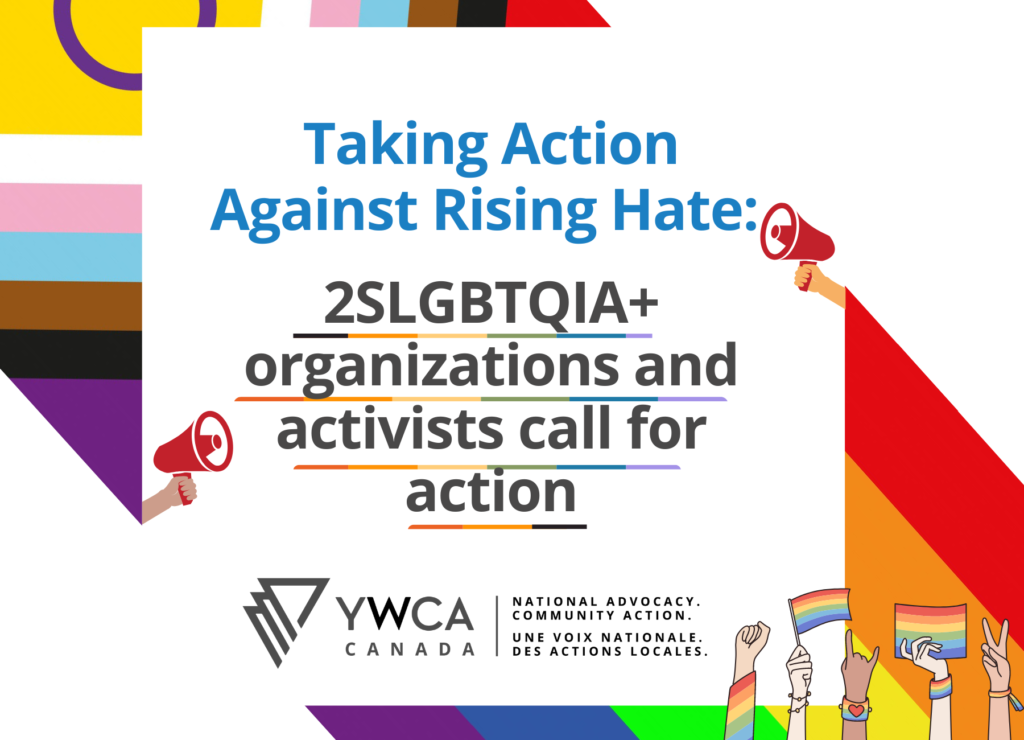Read: 3min
With Pride season in full swing, hateful rhetoric and harmful incidents are also on the rise. Organizations such as Egale and YWCA Canada remind us that International Pride Month is more than a vibrant parade, it is also a time to highlight ongoing violence and the work of change-makers to advocate for and advance the fundamental rights of 2SLGBTQIA+ communities.
Increase in anti-2SLGBTQIA+ violence
Canada is often perceived as a progressive haven for the rights of 2SLGBTQIA+ communities. However, the hard-won progress for sexual and gender rights is being eroded by recent attacks that target and undermine sexual and gender minorities. For over 3 years, we have been experiencing an increase in hate-motivated violence against 2SLGBTQIA+ communities in online and offline spaces. Trans PULSE in its 2020 report highlighted that 72% of trans and/or racialized non-binary respondents experienced verbal harassment and almost 49% experienced sexual harassment in the past 5 years.
A recent report by Brianna Jaffray of the Canadian Centre for Justice and Community Safety Statistics, suggests that this violence could start as early as age 15 and is experienced in public, online and/or at work. In schools, 64% of participants report hearing homophobic comments on a daily or weekly basis (Peter et al., 2021). Despite students facing verbal, physical and psychological violence on a daily basis, schools do little to protect them. While more than three-quarters of trans students who experience physical harassment try to report it, they consider the response of teachers and staff ineffective in addressing transphobic harassment (Peter et al., 2021). This violence is intensified for racialized students and felt more acutely by 2SLGBTQIA+ Indigenous students.
When online and offline violence are no longer separate
Whether on the streets or on our screens, hate in all its forms is a deep concern. When it takes place through technology-enabled means, its consequences are multiple and potential for harm is magnified. As stated by a focus group participant in YWCA Canada’s #BlockHate national research project on online hate: “[it’s] much easier to commit hate and violence online when you hide your identity and hide behind a screen”, adding that “abusers thrive on anonymity”. YWCA Canada’s #BlockHate report shows how youth across Canada, particularly those from historically and structurally marginalized groups experience online hate, “Youth with disabilities are 70 percent more likely to directly experience online hate, youth from 2SLGBTQIA+ and Indigenous communities are about 60 percent more likely, and young Black people are 53 percent more likely to be made targets by online hate.”
What emerges from this report is a call to action from young people across Canada. These recommendations include actionable steps for online social platforms, the federal government, nonprofit and community organizations, youth, and all users of online platforms. The recent spikes in hate-related incidents are no coincidence. This is fuelled by organized and motivated actors and facilitated by systems and policies that do not adequately support and defend targeted communities. Standing up against this rising tide requires a whole systems approach, involving coordinated collective action by multiple sectors and stakeholders. A first step is the recognition that online hate is a reflection of offline systems of oppression and marginalization.
Historically, 2SLGBTQIA+ communities in Canada have disproportionately experienced homelessness, and been at risk of homelessness or other kinds of socio-economic deprivation. This is especially true for Indigenous, racialized, immigrant, newcomer and disabled members of 2SLGBTQIA+ communities. As highlighted in the Trans PULSE report, Indigenous trans and non-binary adult respondents face high rates of housing loss (20.3%), having to move (35.8%) and even food insecurity (27.1%) (Li et al., 2023). The online expressions of hate-motivated violence cannot be detached from offline reality and requires a systemic approach to end ongoing discrimination. Read the #Blockhate report to learn more about the other recommendations resulting from Canada-wide youth consultations.
Working with 2SLGBTQIA+ organizations and activists
The work to dismantle online hate and systems of violence is collective work. Join us in supporting the following campaigns:
- Momentum launched its first federal #Act4queersafety campaign with the support of over 100 organizations, calling on the government to act on the rise of anti-2SLGBTQIA+ hate.
- Egale launched the #MyPrideWontUnravel campaign to highlight the staggering 6,423 incidences of anti-2SLGBTQIA+ hate the organization has tracked in Canada over just the first three months of 2023.
Make your impact as strong as your Pride. Donate and volunteer with these organizations:
